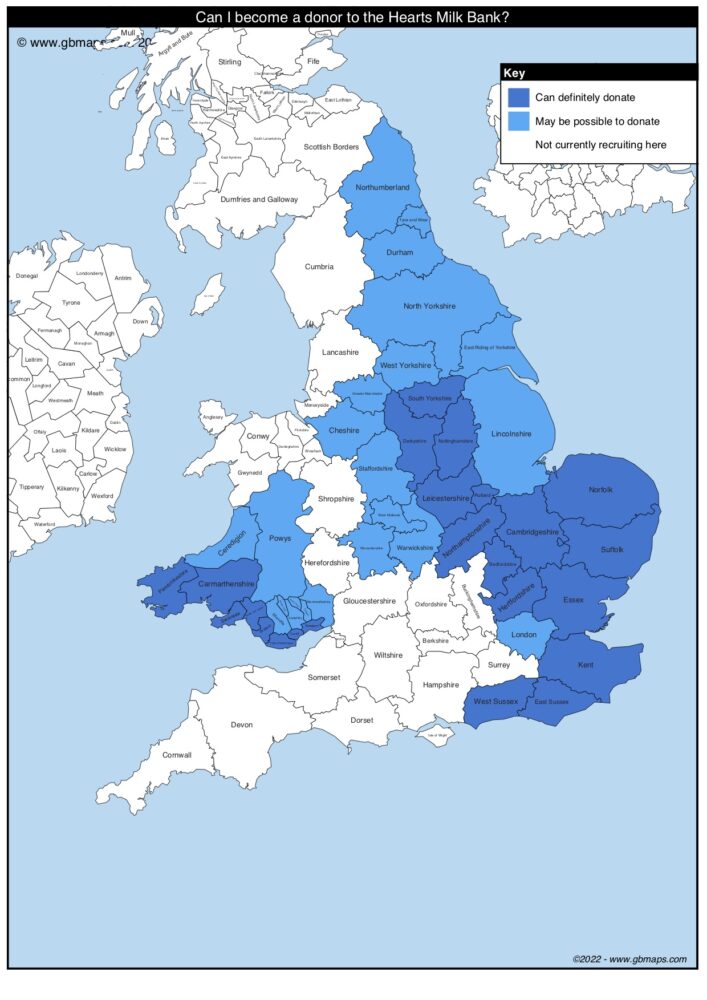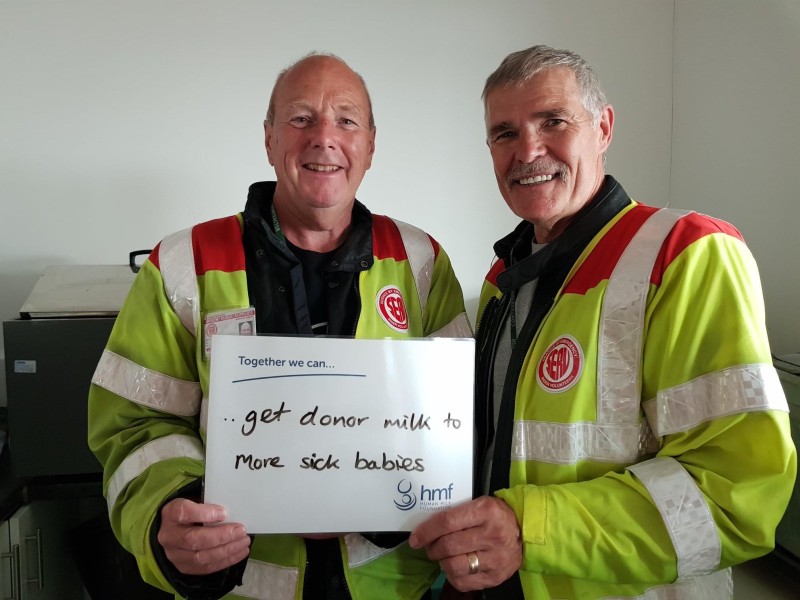Donating milk
Click here
Taking the time to become a milk donor is an amazing step. You could be changing the lives of another baby and their family forever.
Becoming a milk donor is similar to becoming a blood donor. Relatively few things would prevent you becoming a milk donor, but we cannot accept donations if you are smoking, vaping or using nicotine replacement products, or if your child is over 2 years old.
You will need to complete a questionnaire and consent form, which can be done after contacting the team at Hearts (email here). We can also post out or email forms and information to you if you prefer. The questionnaire includes questions about any recent overseas travel and about your medical history, as well as your baby’s health and how you are expressing milk. Please contact the milk bank by phone (01442 505 020 / 01442 505 021 between 9.30 am and 5:00 pm) or by email (info@heartsmilkbank.org), if you would like us to guide you through the process.
Once we have checked through your forms, we will post out a kit that contains everything you will need for blood tests to be taken. These can be arranged at your GP or local phlebotomy centre, wherever you usually access blood tests. We are required by national guidelines to test all donors for HIV1 and 2, hepatitis B and C, syphilis and human T-lymphotropic virus (HTLV). These are all infections that we can have without knowing and which may get into breastmilk. Scroll down to the bottom of this page to read more about these infectious diseases.
The blood results take about 7- 10 working days to come back from our partner NHS laboratory. Once we have your results, we will send you instructions on how to arrange your first collection.
Every container (bag or bottle) of milk for donation will need to be labelled with your name or unique Hearts Milk Bank donor ID number, the date it was expressed and details of any medications taken within the previous 24 hours.
If anything changes, you need to take a new medication or move house, or would like to stop donating, please get in touch with the Hearts team.
All of our processes are in line with the NICE Clinical Guideline #93 for the Operation of a Human Milk Bank. If you have any questions about the process of becoming a milk donor, please call us on 01442 505 020 / 01442 505 021 between 9.30am - 5.00pm.

The Hearts Milk Bank is working towards making it possible to donate your milk regardless of where you are based. If there is a more local milk bank to you, we ask you to contact the team there first. You can find a list of all UK milk banks on the UK Association for Milk Banking website.
The Hearts Milk Bank now has donor milk hubs in Norfolk, Kent, South Wales, Sussex and Northumbria, with plans for hubs in other regions in the near future.
We can currently accept milk donors from Hertfordshire, Bedfordshire, London, Essex, Kent, Sussex, Northamptonshire, Cambridgeshire, Suffolk, Norfolk, Nottinghamshire, Derbyshire, Warwickshire, Worcestershire, the Midlands, Staffordshire, Derbyshire, Cheshire, Greater Manchester, West Yorkshire, South Wales and Northumbria. To download a PDF of the map showing these regions more clearly click here.
Although we recommend you contact your closest milk bank, most have different recruitment criteria around the age of your baby and which medications can be accepted, so please get back to us if you are not eligible elsewhere. If you would like to become a milk donor, please email us info@heartsmilkbank.org or call 01582 314 130 / 1.
You and your baby come first. We are only able to accept milk that is truly surplus to your baby’s needs and can help if you would like to manage an oversupply down. If you are mixed breast and formula feeding or if your baby has been diagnosed with cow’s milk protein allergy or other food intolerance, please contact the milk bank team for advice.
We are unable to accept donations if you are smoking, vaping or using any nicotine replacement products or if your partner or other household member smokes or vapes in the house. However, we recommend that you don’t stop breastfeeding as the recommendations for milk donors are very different from those when breastfeeding your own baby. Please contact the milk bank team if you would like more advice.
If you do smoke or vape, you may be able to join a research study run in collaboration with Imperial College London that is helping scientists understand better ways to screen women for cancer. Please contact the team to find out more.
Some medications may exclude you from donating milk for preterm or sick infants, even though they are safe to take when breastfeeding your own baby. Please contact us to discuss, as some of these medications may be acceptable for donation for full term or older babies.
Yes we can. Please note that it must have been expressed into sterile bags or other suitable containers within the last 3 months. Expressed milk needs to have been refrigerated immediately and then frozen within 24 hours of being expressed. We will ask you some questions about the time when you were expressing the milk and we will also need each container to be labelled.
Yes, you can start expressing as soon as you receive the milk containers, or even sooner if you store your milk into bags. Please note that we cannot arrange to collect your milk until we have had your results back from the lab.
The Hearts Milk Bank asks donors to use a pump that is new to them, unless it is a hired or hospital grade pump that is designed for use by more than one person. This is because a normal second-hand pump may contain micro-organisms and biofilms from the previous owner that cannot be easily removed via cleaning as these can get inside the pump casing. Hospital grade pumps are cleaned between users and contain special valves to ensure that no micro-organisms can enter the pump casing.
We ask donors to use pumps that actively express the milk rather than passively collect it. This is because The Hearts Milk Bank mainly provides milk to hospital neonatal units for sick and preterm babies who have high energy and nutrient requirements and can only tolerate small volumes of milk. These soft silicone style pumps are designed for those with a great milk supply who also tend to leak or let down their milk very easily. The pumps collect milk from the opposite breast whilst feeding or simply take off milk easily from a full breast without any suction or motor being used. This leads to the milk generally being of a low-fat content as they don’t ‘empty’ the breast which is when the higher fat milk is collected. For these reasons we ask donors to use pumps that actively express the milk rather than passively collect it.
You will need to clean the pump externally before you use it and replace all of the attachments. These include the suction tubing that attaches to the pump, the breast flange (please ensure you have the correct size) and all parts that come into contact with the milk. Please follow the manufacturers or rental company’s instructions for cleaning the pump and the attachments between uses.
There are many pumps available to buy. If you have a good milk supply and surplus milk to donate you will not need anything expensive or high tech! The most important aspect to consider is that your pump is reliable.
You may not necessarily need to have an electric pump – a small hand operated pump could be all that you need to express a large amount of milk easily and quickly. Things that might influence your choice are portability if you pump outside of the home, and a bra-worn electric pump or something small to carry in your bag in this instance could be useful.
Please note: If you do express your milk outside of the home, please be sure to store it in a clean cool bag with frozen gel packs to cool it quickly and stay at low temperatures that prevent any bacteria from multiplying. Please transfer it immediately to your freezer once you get home.
If you have had a blood transfusion in the last 4 months your blood tests may need to be delayed. However, you can still collect and store milk for donation in the meantime. Please contact the milk bank team for more advice.
We ask for a minimum of 2 litres expressed within 8 – 9 weeks from our ongoing donors. This is to allow us time to arrange a collection of your milk and pasteurise it within 3 months, in line with the National Institute for Health and Care Excellence (NICE) guideline. If your frozen milk is older than this please contact us to discuss.
Yes, all milk is precious to the families who receive your milk. However, we recommend that if you have not become a donor by the time your child is approaching their second birthday, it is best not to start. This is because it can be very difficult to maintain a supply once your toddler is over 2 years old, and research suggests that some of the elements of milk can start to reduce after 24 months as your child feeds less frequently.
Yes, your freezer where you store your expressed milk that you wish to donate should be kept at a consistent temperature of less than -18 degrees. We send all of our milk donors a recruitment pack which includes a thermometer so you can ensure your freezer is the correct temperature. We suggest storing your frozen milk as close as possible to the bottom of the freezer, as this is usually the coldest part.
Donated milk is tested for bacteria and pasteurized to kill any bacteria or viruses. It is then checked by the laboratory again for any contamination, and stored in a temperature-monitored freezer. It will be couriered while still frozen to one of the hospital neonatal units we supply.
The HMB adheres to guidelines developed in 2010 by the National Institute for Health and Care Excellence (NICE) regarding the screening, processing, and dispensing of donor milk to ensure its safety. Donor milk is specially heat-treated to destroy harmful bacteria or viruses. This process, called pasteurisation, heats milk very quickly to 62.5C before rapidly cooling the milk to limit the destruction of the health promoting components in the donated milk. Around 70% of the antibodies in the milk will usually survive and be functional to help the baby fight infections; all of the special sugars called oligosaccharides are preserved and functional after pasteurisation, which helps support the development of the gut, microbiome and immune system. As well as providing nutrition, human milk contains hundreds of other components that help the brain to develop, the baby to grow normally, and the immune system to develop. Heat treatment does not appear to markedly affect the nutritional quality of milk, and a study on full term babies fed with donor milk from the Hearts Milk Bank showed all babies grew as expected for their age and whether male or female.
Yes. The HMB aims to recruit enough donors and process enough milk to enable other patient groups to benefit when their mother’s own milk is not available. Donor milk can also be used as a bridge to support infants while their mothers establish a full milk supply. The Human Milk Foundation supports hundreds of families each year to feed their babies with human milk who would not be eligible for NHS-funded donor milk.
In common with non-profit milk banking and blood and tissue donation worldwide, we don’t offer payments for milk. If you need reimbursing for parking or travel to have your bloods taken, please let us know.
All new milk donors are asked to have a blood test to rule out HIV1 and 2, hepatitis B and C, syphilis and human T-lymphotropic virus (HTLV). You will have already been tested for most of these during your pregnancy, except for HTLV which is not routinely screened for in the UK.
All these viruses can be passed through breastmilk from a mother to a baby, so we need to rule out the possibility that you might have these and that they might be passed through to a baby in any breastmilk you donate.
We are often contacted by mums who would like to donate a previously expressed stash of frozen breast milk. Unfortunately, we are not always able to accept donations if the milk was expressed over 3 months ago or if you are taking certain medications. This is because we need to comply with national milk banking guidelines as donor milk is going to very tiny and sick babies in hospital. However, every drop of your milk is precious and there are many ways you can use your milk that cannot be donated. We’ve compiled some handy ideas and tips in this PDF leaflet
HIV is a virus that weakens the immune system and can eventually lead to Acquired Immunodeficiency Syndrome (AIDS). There are two main types of this virus: HIV-1 and HIV-2. HIV-1 is the most common type of HIV and occurs all over the world. Around 95 percent of people living with HIV have HIV-1.
HIV-2 is mainly present in West Africa, but it is starting to appear in other regions, including the United States, Europe, and India. A person can contract either type of HIV through direct contact with bodily fluids that contain the virus, including blood, sexual fluids, and breastmilk.
Hepatitis is the term used to describe inflammation of the liver. It is usually the result of a viral infection or liver damage caused by drinking alcohol.
Hepatitis B is caused by the hepatitis B virus, which is spread in the blood of an infected person. It is a common infection worldwide and is usually spread from infected pregnant women to their babies, or from child-to-child contact. It can also be spread through unprotected sex and injecting drugs.
Hepatitis B is uncommon in the UK. Most cases affect people who became infected while growing up in parts of the world where the infection is more common, such as southeast Asia and sub-Saharan Africa. Most adults infected with hepatitis B can fight off the virus and fully recover from the infection within a couple of months. But most people infected as children develop a long-term infection. This is known as chronic hepatitis B, and it can lead to cirrhosis and liver cancer. Antiviral medication can be used to treat it.
Hepatitis C is caused by the hepatitis C virus and is the most common type of viral hepatitis in the UK. It’s usually spread through blood-to-blood contact with an infected person. In the UK, it is most commonly spread through sharing needles used to inject drugs.
Hepatitis C often causes no noticeable symptoms, or only flu-like symptoms, so many people are unaware they’re infected. Around 1 in 4 people will fight off the infection and be free of the virus. In the remaining cases, it will stay in the body for many years.
This is known as chronic hepatitis C and can cause cirrhosis and liver failure. Chronic hepatitis C can be treated with very effective antiviral medications, but there’s currently no vaccine available.
Syphilis is a bacterial infection that’s usually caught by having sex with someone who is infected. Some people with syphilis have no symptoms but if it is left untreated for years, syphilis can spread to the brain or other parts of the body and cause serious long-term problems including damage to the brain, eyes, heart, nerves, bones, joints, and liver.
Human T-cell lymphotropic virus types 1 and 2 (HTLV-1 and HTLV-2) are retroviruses that are found worldwide. HTLV-1 can cause a form of blood cancer; adult T-cell leukaemia or lymphoma (ATL) or a progressive disease of the nervous system called HTLV-1 associated myelopathy. Although HTLV is relatively uncommon in the UK, approximately 22,000 people live with the virus and so it is important that we test for it to ensure it is not passed through your milk.

At the Hearts Milk Bank (HMB) we believe that every bereaved family should be given professional support and accurate information to help them make decisions about lactation and their breastmilk. Some women find donating milk after the loss of their baby to be a comfort, representing a gift from them both to other mothers and their tiny or sick babies. The impact of this can be very profound. ‘Snowdrop Donors’ receive support, both practical and emotional, from our team throughout the process of donating milk. Our charity honours their gift by planting and sharing snowdrop flowers, and we work with hospitals to make sure bereaved families are aware of all their options regarding their stored milk and their lactation, and that they are supported to make the choices that are right for them.
More information about donating after bereavement >
“The ability to express my milk during the days and weeks after Gabriel Ray died helped with my grief. It helped me feel connected to our baby, whilst allowing him to share something with other babies. It also had huge health benefits for me. ” – Emily, Snowdrop donor
“We decided to donate my oversupply to sick babies that really need the milk. We just couldn’t get through it all, and rather it going to waste, we wanted to do anything we could to help. And I say ‘we’ because it’s completely a team effort. My partner helps to label up the bottles and pools all the milk in for me, and obviously my beautiful daughter who helps me create the milk. It means a lot to me to help parents who need milk.” – Dani, milk donor.

As we enter the colder months, we are sharing guidance with all milk donors as sometimes lifestyles can change during seasonal holidays. We are so grateful for every donation you send, as demand for donor milk often increases over the winter months. Your freezer space may also be at a premium at this time of year, so you may be thinking about sending us a donation to make space.
We hope that this advice which covers criteria for donating milk, tips on managing milk supply over the holiday period, our process regarding donating during cold and flu season and advice about medication, will help to answer any questions you may have over the coming months.
Please click the link below to download our PDF with guidance.
Thank you for donating your milk to help sick and tiny babies and for your cooperation with the guidance. Please contact us on info@heartsmilkbank.org if you have any queries.

We couldn’t do what we do without the generosity of the SERV (Service by Emergency Response Volunteers) ‘Blood Bikers’ – an entirely volunteer led organisation that supports the delivery of emergency blood, plasma, tissue samples and donor milk by using its dedicated fleet of motorcycles and 4 x 4 vehicles. Their rapid response service enables donor milk to be transported to hospital neonatal intensive care units where it helps vulnerable premature babies. The ‘Blood Bikers’ also collect donor milk from our milk donors at home and transport it to the milk bank for pasteurisation and testing, and deliver pasteurised, frozen donor milk to recipient families in the community.
The first group to work with Hearts, the SERV Herts and Beds were awarded The Queen’s Award for Voluntary Service for 2022. This is the highest award a local voluntary group can receive in the UK and is equivalent to an MBE for organisations such as theirs. Read more here >
Baby Eleanor was diagnosed with a rare heart condition at birth. Read the amazing story about how Kerry donated her surplus expressed milk to the Hearts Milk Bank.
READ KERRY & ELEANOR'S STORY